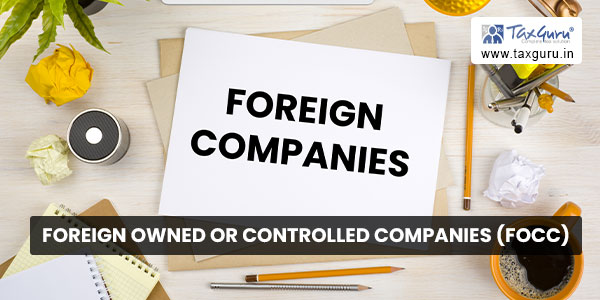Introduction
Foreign Owned or Controlled Companies or FOCC is a familiar name for Indian subsidiaries or entities controlled of/by non- resident/ foreign or multinational companies. FOCC is an Indian company set up or owned or controlled by a non- resident/ a foreign company or MNCs (hereinafter referred as parent company). FOCC becomes a great source of investment for those companies who wish to invest and have a controlling interest and ownership in the investee or even want to conduct business operations in India as a domestic company. Foreign company conducts business operation in India but with the status of a foreign company which holds them back from the benefits enjoyed by a domestic company. As a result, many companies prefer to incorporate a FOCC to enjoy the benefits of a domestic company like Disney India, Star India etc.
Guidelines for Incorporation
There are certain compliances that are needed to be adhered to at the time of obtaining ownership/ control. Companies Law and Foreign Exchange Management Law (FEMA) are two major laws that govern the whole process. Companies Law governs the whole incorporation process and FEMA governs the investment related procedures. The incorporation process is same as that of a domestic company except for some additional requirements like for examples the requirement of having at least one Indian director out of two directors if the FOCC is a private limited company. The documents provided by the foreign director should be in English and apostille.
As said earlier, due to investment from foreign country FEMA acts as strict watch guard. Before investing, one has to take care of certain regulations like sectoral cap, routes of entry, allowed and prohibited sectors, etc. One cannot invest in any sector, in any proportion, in any manner as he or she prefers. There is an exhaustive list of sectors from each point of view. Let us understand this with help of an example.
For example- Nuclear Power is one of the prohibited sectors where Foreign Investment is not allowed. So if a parent company wishes to set up a nuclear power plant in India and for that it is forming a company, it is strictly prohibited.
There are certain sectors where a certain percentage of foreign investment is allowed but after that they become prohibited. Entities in Digital Media sector are allowed to have foreign investment of maximum 26%. So a foreign company cannot invest in the domestic company beyond the limit of 26% in this sector. Beyond that it also becomes a prohibited sector. Taking digital media, the investment of 26% needs approval from government (means it comes under the approval route and not the automatic route).
There are some sectors where automatic approval is there for a certain limit, then one needs to take approval from government and after that it becomes prohibited. Entities in private sector banking can have 49% auto investment, above 49% to 74% with government approval, and beyond that it is prohibited.
Different Types of FOCC
Knowing about the pre- conditions we can now move towards the types of FOCC. FOCC can be set up as a joint venture as well as Wholly- Owned Subsidiary (WOS). WOS can be set up by the parent company only for sectors where 100% foreign investment is allowed under automatic route and none other than that. Joint ventures can be set up in sectors where regulations of FEMA permit. A parent company can also acquire equity instruments (instruments like equity shares, compulsorily convertible preference shares and debentures) in an existing company and make the latter a FOCC.
The procedure and compliances for all the three are different.
For setting up a WOS-
First the company needs to be incorporated in India. The process is quite similar to incorporation of a Non WOS. The Parent company has to nominate one director through a resolution who will represent the parent in the functioning of WOS ( The nominated director can be Indian or foreign national). There also needs to be a second director who has to be mandatorily Indian if the first director is not an Indian citizen. After incorporation, subscription money has to be received from the parent company and Foreign Inward Remittance Certificate (FIRC) along with KYC of the foreign investor needs to be collected from the Authorized Dealer Category I banks. Then the company needs to file FC- GPR (Foreign Currency- Gross Provisional Return) for approval from RBI.
For setting up a joint venture-
There are two alternatives method for this:
- If it is a sector under automatic route then the same process as that of WOS has to be followed.
- If it is a sector under approval route additionally, prior approval has to be taken from government after which the subscription money can be brought into India.
For acquiring equity instruments in an existing company-
There are two methods of acquiring interest in an existing company. The first one is transfer of equity instruments and the other one is issue of new shares. As in most cases, there will be transfer of equity instrument, so Foreign Currency- Transfer of Shares (FC-TRS) needs to be filed with RBI. But if new shares are issued, the domestic company needs to file FC- GPR along with statutory requirements of Companies Law.

Process for obtaining approval-
Department of Industrial Policy & Promotion (DIPP) along with concerned sector ministry manages the approval process of Foreign Direct Investment (FDI) from FDI portal- Foreign Investment Facilitation. An application has to be submitted as a proposal along with the documents required on the portal. If the application is not digitally signed, then a copy of the application has to be submitted physically also. DIPP sends the application to the concerned ministry and RBI within two days of receiving it. The ministry can ask for any additional information required and DIPP has to give the clarification within 15 days from receiving it from the applicant. After receiving the required information, the decision is communicated within 2 weeks. In cases where security clearance is required like investment from countries of concern like Pakistan or Bangladesh, Union Home Ministry is to be communicated and its approval is also required. If the investment amount exceeds INR 5000 Crore, Cabinet Committee of Economic Affairs is to be involved. If the proposal is to be rejected by the concerned ministry, DIPP has to be consulted.
Process for reporting of funds received-
Whether funds are received through direct route or approval route, the domestic company is required to report to the RBI about receipt of funds. This is done through the AD bank through which the funds have been received by reporting in FC-GPR containing details like name and address of parent company, date of receipt of fund, rupee equivalent, etc.
Process for filing FC- TRS
RBI has introduced a special portal Foreign Investment Reporting and Management System (FIRMS) in which it has subsumed multiple forms for foreign investment. For filing of form, registration has to be made on the portal. Two types of registration have to be availed i.e., Entity User and Business User. The onus of filing remains with the resident of India, whether transferor or transferee, but if the shares are acquired from stock exchange by the parent company, then, it has to file the form. Some of the details that are required to be filled are: investment details like CIN, PAN number; particulars of transfer like type and face value of securities; remittance details like mode of payment, name of AD Bank. Some attachments are also required which are different in case of gift and sale. In case of gift, name and address of donor and donee; relation between them; reason needs to be attached. In case of sale, consent letter for transfer/ receipt of consideration, shareholding pattern of the company before and after acquisition by the person resident outside India needs to be attached.
Process for filing FC- GPR-
FC- GPR is also filed through the FIRMS portal of RBI. FC- GPR is filed when equity instruments are issued by a domestic company to a person/ entity resident outside India. The onus of filing is with the domestic company within 30 days of allotment of instrument. Some of the details are pre filled due to the registration and some have to be filled. Details of investee company are pre filled like CIN, company name, PAN details. Details that are required to be filled are: FDI details, Issue details, details of Foreign Investors, details of Amount of Issue, Particulars of Issue, Shareholding pattern, etc.
FDI details: entry route, applicable sectoral limit
Issue details: date of issue, nature of issue
Details of Foreign Investor: general details like name, address, country of residence
remittance details like name & address of AD bank, mode of payment, FIRC no.
Details of amount of issue: total amount of inflow, amount for which equity instrument issued
Particulars of Issue: type of capital instrument, number and issue price of such
Shareholding pattern: pre transaction value is auto calculated and post transaction value is calculated on the basis of the particulars of issue provided.
Valuation Requirements
In case of FOCC valuation requirements may arise in the following scenario:
- If incorporating a FOCC:
- Companies Act: No requirement of Valuation
- Income Tax Act: Valuation requirements as per relevant section from a Practicing Chartered Accountant(Non DCF method) or from a Merchant Banker(Any method)
- FEMA guidelines: Valuation by a Practicing Chartered Accountant/ Cost Accountant or a Merchant Banker may be required under FEMA guidelines for filing FC-GPR
- If acquiring capital instruments of a FOCC: If existing shares of a company is being bought from a shareholder then the following needs to be done:
- Companies Act: No requirement of Valuation
- Income Tax Act: Valuation requirements as per relevant section from a Practicing Chartered Accountant(Non DCF method) or from a Merchant Banker(Any method)
- FEMA guidelines: Valuation by a Practicing Chartered Accountant/ Cost Accountant or a Merchant Banker required under FEMA guidelines for filing FC-TRS
- If fresh issue of shares is being done:
- Companies Act: Valuation to be done by a Registered Valuer
- Income Tax Act: Valuation requirements as per relevant section from a Practicing Chartered Accountant(Non DCF method) or from a Merchant Banker(Any method)
- FEMA guidelines: Valuation by a Practicing Chartered Accountant/ Cost Accountant or a Merchant Banker may be required under FEMA guidelines for filing FC-GPR
Annual Compliances
FEMA guidelines:
Annually form FLA (Foreign Assets and Liability) is required to be filed. It covers details of all foreign holding in the company whether it is a FDI (Foreign Direct Investment) or FPI(Foreign Portfolio Investment). It also covers details about ODI(Overseas Direct Investment) made by the company, if any.
Income Tax
Apart from the usual annual returns a FOCC is also required to file Transfer Pricing Report(Form 3CEB) with the Income Tax Authorities in case of specified transactions with its foreign Associated Enterprises. This involves getting these transactions audited by a Practicing Chartered Accountant.
Along with the usual compliance requirements, a foreign company is also required to file eForm FC-3 (Annual accounts along with the list of all principal places of business in India established by foreign company) and E form FC-4(Annual Return).





